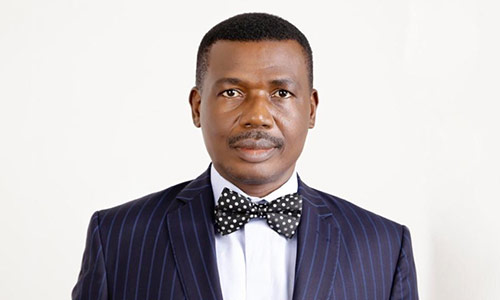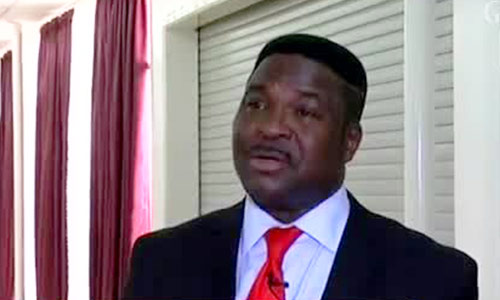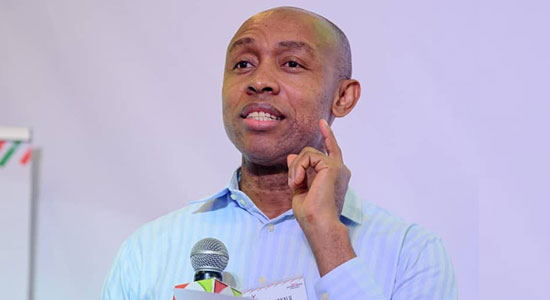The Minister’s Albatross

By Ebun-Olu Adegboruwa, SAN
Under and by virtue of section 147 (1) of the Constitution of the Federal Republic of Nigeria as amended, “there shall be such offices of Ministers of the Government of the Federation as may be established by the President.” These Ministers serve as members of the Federal Executive Council and they hold weekly meetings with the President to review memos and take decisions on many issues. Ordinarily, Ministers do not have their own specific manifesto except as directed by the President but by the doctrine of collective responsibility, they all rise and fall with the President, in the conception and implementation of programmes and policies. In 2007, an unusual thing happened in the political landscape of Lagos State when a green horn in political circles won the governorship election on the backing of his godfather. He would however proceed to disappoint his critics and prove pundits wrong with his more than sterling record of performances hitherto unknown in governance. Babatunde Raji Fashola, SAN was at all relevant times a successful lawyer, a bureaucrat and a dutiful professional before fate landed him in government house in Alausa in 2007. I had privileged information then to know that the weekly executive council meetings hosted by Fashola were real intellectual drills for his Commissioners, as Fashola would have read all the papers and memos to be presented cover to cover. He also inspired other professionals to venture into the murky waters of politics like Emmanuel Udom, Rotimi Akeredolu, SAN and many others.
I have given the above background to justify the enthusiasm of Nigerians when Fashola was nominated into the federal cabinet and eventually appointed as Honourable Minister of Power, Works and Housing, more like the Prime Minister of the Muhammadu Buhari administration. Earlier during his stint as Governor of Lagos State, Fashola was quoted as stating that his government would fix electricity in six months, a statement he would later deny upon assumption of office as Minister in charge of power. Nevertheless, fate bestowed the responsibilities of supervising some of life’s basic amenities for the people of Nigeria, upon Fashola. The power sector under Fashola performed woefully, with constant power outages, grid collapses and even arbitrary tariff increases. We never really got to the peak of the 5000 megawatts which has been the sing song of every government in power for ages. Fashola came, saw and could not conquer the principalities of the power sector, until he was relieved of that portfolio, wherein his successor had not fared any better.
The rate at which private estates spring up in Nigeria should provide the basic summary of Fashola’s tenure as Minister of Housing, the greatest problem being the outdated Land Use Act that governments in Nigeria deploy to deny the common people of their inheritance. The Lagos State Government under Fashola stoutly resisted all attempts to amend the Land Use Act because land is considered as the oil and gold of Lagos, but that archaic piece of legislation has been his undoing in the provision of affordable houses for the masses of our people. Ownership of land is mostly customary, depending on the traditional history of the founding radical owners. So, for the government to just wake up with legislation donating the power of acquisition of land for very ludicrous and ambiguous purposes, shows the disregard that our leaders have for their people. Why should the government be involved in the actual management of land, when experiences have taught that many only use the Land Use Act as a means of self-aggrandizement?
Should we talk about roads at all? In its manifesto, the All Progressives Congress, APC promised a minimum of 5,000 kilometres of superhighway every year. It is now almost eight years and I do not think that 1,000 kilometres of new superhighway has been added to our collapsed road network. I have not travelled round Nigeria by road so it may not be possible for me to assess the situation of roads in other parts of the country. But I do travel around the South-West and I can say without fear of contradiction that no new expressway has been embarked upon by Fashola. The existing roads have virtually collapsed. What Fashola and the APC have done is to embark upon repairs of some roads, without actual completion. The Sagamu-Benin expressway has been abandoned, as the Lagos/Ijebu-Ode portion has practically failed. I had written in the past to commend Fashola on the good work done on the Ijebu-Ode/Ore portion of the road but such laudable effort has paled into insignificance when one considers the pain and agony of the Sagamu/Ijebu-Ode axis of the road. The Lagos-Ota expressway is now a death trap. Recently, the governor of Ogun State, who is also of the APC stock, had cause to call out Fashola on the state of that road and the negative impact it has had upon businesses and human lives, especially during the rainy season. A friend who travelled to Ilorin through Ogbomoso recently told me that there are still bad portions on the road that need to be repaired. Now to the Lagos-Ibadan expressway. The Goodluck Jonathan administration danced upon the graves of many Nigerians who perished on that road when he rolled out the drums to celebrate a phantom project that never saw the light of the day until he left office. Eight years down the lane, that expressway has been the albatross of Fashola, who by now has exhausted all excuses available on earth and has been drained of futile promises. Unless some kind of miracle happens before May 29, that road will not and cannot be completed before the exit of Fashola.
It is difficult for me to understand the reason or reasons for the delay in the completion of the busiest expressway in Africa, especially given the time and resources devoted to it, from Sukuk funds to Abacha loot. When you navigate through the Lagos-Ibadan expressway around the Mowe/RCCG belt, the road reconstruction has been badly executed and it is failing already. I doubt very much that it will take another three years before we start talking of another road repair again. This should not be the standard for road construction. Fashola had midwifed the reconstruction of the Apapa-Oshodi expressway through a private concessionaire. This has eased the pains of commuters and motorists who have cause to use that road daily. The quality of that job is quite commendable save for one or two planning defects here and there. Still talking about road construction, let us focus on the Third Mainland Bridge. For months, the bridge was closed for alleged repair works. It was hellish moving from the Island to the Mainland regions of Lagos during that period. The expectation then was that upon completion, the road will become motorable. The bridge has become the only bridge I know that has potholes, with the asphalt upon the concrete bed almost washed off. Should Fashola not have used the period of the closure of the bridge to execute all repair and reconstruction works?
It is too late in the day now to give reasons why the Lagos-Ibadan expressway cannot be completed and we can hardly do anything about the deep potholes dotting the landscape of the road from Sagamu to Ijebu-Ode and beyond. We cannot summon Fashola in this dying moment of his tenure to give explanations on why the Lagos/Ota/Abeokuta roads have not been repaired. Should we even talk about the Lagos-Badagry expressway, one of the gateways to the commercial soul of Nigeria? I understand that motorists and commuters go through hell in wading through the failed international expressway. It is only a matter of days for Fashola to hand over to the most senior person in his ministry. I do not seek to summarize eight years of a special assignment in just one article as I am well aware that the second Niger bridge may be commissioned very soon. And there are probably other projects going on in various regions across Nigeria. It certainly cannot be an easy task for a legal practitioner to suddenly transform into an engineer, a builder and power sector reformer. It may well be that the Honourable Minister did his best in the circumstances in which he found himself, or maybe he could have done much better. History will be the ultimate judge.
It is important for the APC as a political party and for Fashola as a politician to sit down and take stock. Governance at any level is best measured by the performance of those entrusted with power, not necessarily a matter for soap box oratories or blatant propaganda. The three areas of road, power supply and housing which Fashola was given the responsibility of piloting have not witnessed much turn around for the past eight years. It could well be the case of Paul planting and Apollos watering such that the fruits of all the good seeds planted by Fashola would become manifest many years to come. To my mind, his areas of responsibility are largely empirical such that any successful implementation would meet with actual verification. I have my innate suspicion that Fashola may still be around and active in the coming years, in the life of Nigeria. From his eight years in Lagos State to the eight years at the federal level, there is sufficient experience that he must have gained to enable him deliver the dividends of democracy in any future assignment that he may be entrusted with. Notwithstanding the many unresolved challenges of his various offices, Fashola still remains a role model in humility, diligence, team work and liberalism and most probably a head above many.



